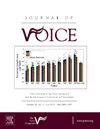Effect of Behavioral Cough Suppression Therapy Delivered via Telehealth
IF 2.5
4区 医学
Q1 AUDIOLOGY & SPEECH-LANGUAGE PATHOLOGY
引用次数: 0
Abstract
Objectives/Hypothesis
Behavioral cough suppression therapy (BCST) has demonstrated up to 88% effectiveness at treating refractory chronic cough (RCC). With onset of the COVID-19 pandemic, along with many other medical services, BCST shifted to telehealth delivery. Our group hypothesized that BCST delivered via telemedicine by a specialized Speech-Language Pathologist would be comparable to previously reported response to treatment for in-person settings.
Study Design
Retrospective review.
Methods
An Emory IRB approved, retrospective review of electronic medical records was completed for RCC patients who received BCST via telehealth from March 2020 through January 2022 at Emory Voice Center. Patients were included in the study if they had a diagnosis of RCC, were referred for BCST, were seen for at least one therapy session in the telehealth setting, and provided Cough Severity Index (CSI) data pre and post-treatment. Patients were excluded if they had incomplete datasets, a known pulmonary condition, structural laryngeal disorders, smoking history, dysphagia, and ACE-inhibitor use. Change in CSI score pre- and post-treatment was calculated to determine treatment effect. Paired-samples t-tests were conducted to compare pre-and post-treatment CSI score change.
Results
Fifty-one RCC patients were included in this study; 88% were female with an average age of 60 years (SD = 12.68). Post-treatment CSI scores were significantly lower than pretreatment CSI scores (P < 0.0001). These findings are comparable to historical documented CSI change achieved with in-person BCST.
Conclusions
This study provides preliminary evidence of the efficacy of BCST via telehealth for treating RCC. The findings of this study support the continued flexibility in speech-language pathology service delivery to include in-person and telehealth platforms for RCC beyond the COVID-19 pandemic.
通过远程医疗提供行为止咳疗法的效果。
目标/假设:行为止咳疗法(BCST)治疗难治性慢性咳嗽(RCC)的有效率高达 88%。随着 COVID-19 大流行的爆发,BCST 和许多其他医疗服务一样,转向了远程医疗服务。我们的研究小组假设,由专门的言语病理学家通过远程医疗提供的 BCST 与之前报道的面对面治疗反应相当:研究设计:回顾性研究:对 2020 年 3 月至 2022 年 1 月期间在埃默里语音中心通过远程医疗接受 BCST 的 RCC 患者的电子病历进行回顾性审查。如果患者确诊为 RCC、被转诊接受 BCST、在远程医疗环境中至少接受了一次治疗,并提供了治疗前和治疗后的咳嗽严重程度指数 (CSI) 数据,则被纳入研究范围。数据不完整、已知肺部疾病、喉部结构性疾病、吸烟史、吞咽困难和使用 ACE 抑制剂的患者将被排除在外。计算治疗前后 CSI 评分的变化以确定治疗效果。对治疗前后的 CSI 评分变化进行配对样本 t 检验:本研究共纳入 51 名 RCC 患者,其中 88% 为女性,平均年龄为 60 岁(SD = 12.68)。治疗后的 CSI 评分明显低于治疗前的 CSI 评分(P < 0.0001)。这些结果与历史记载的当面 BCST 所实现的 CSI 变化相当:本研究提供了通过远程保健治疗 RCC 的 BCST 疗效的初步证据。这项研究的结果支持语言病理学继续灵活地提供服务,包括在 COVID-19 大流行后通过面对面和远程医疗平台治疗 RCC。
本文章由计算机程序翻译,如有差异,请以英文原文为准。
求助全文
约1分钟内获得全文
求助全文
来源期刊

Journal of Voice
医学-耳鼻喉科学
CiteScore
4.00
自引率
13.60%
发文量
395
审稿时长
59 days
期刊介绍:
The Journal of Voice is widely regarded as the world''s premiere journal for voice medicine and research. This peer-reviewed publication is listed in Index Medicus and is indexed by the Institute for Scientific Information. The journal contains articles written by experts throughout the world on all topics in voice sciences, voice medicine and surgery, and speech-language pathologists'' management of voice-related problems. The journal includes clinical articles, clinical research, and laboratory research. Members of the Foundation receive the journal as a benefit of membership.
 求助内容:
求助内容: 应助结果提醒方式:
应助结果提醒方式:


